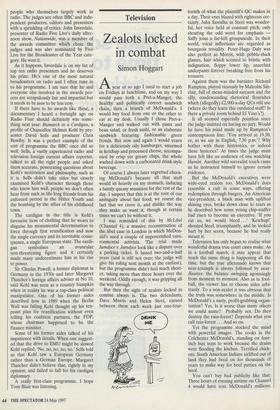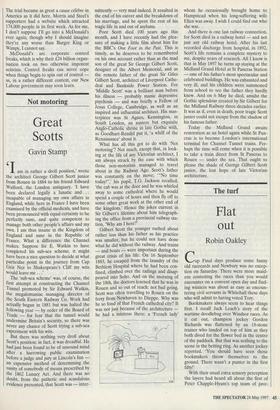Television
Zealots locked in combat
Simon Hoggart
Ayear or so ago I used to start a job on Fridays at lunchtime, and on my way I would pass both a Pret-a-Manger, the healthy and politically correct sandwich chain, then a branch of McDonald's. I would buy food from one or the other to eat at my desk. Usually I chose Pret-a- Manger and walked out with pasta and bean salad, or fresh sushi, or an elaborate sandwich featuring fashionable green fronds. But now and again I would yearn for a deliciously oily hamburger, smarmed in ketchup and processed cheese, accompa- nied by crisp yet greasy chips, the whole washed down with a carbonated drink-style beverage.
Of course I always later regretted choos- ing McDonald's because all that stuff would sit heavily on my stomach, inducing a faintly queasy sensation for the rest of the day. I suspect that this is at the root of our ambiguity about fast food; we resent the fact that we crave it, and dislike the way they make us want it, though at certain times we can't be without it.
I was reminded of this by McLibel (Channel 4), a massive reconstruction of the libel case in London in which McDon- ald's sued a couple of impoverished envi- ronmental activists. The trial made Jamdyce v. Jamdyce look like a dispute over a parking ticket. It lasted two-and-a-half years (and is still not over; the judge will give his ruling next month at the earliest), but the programme didn't feel much short- er, taking more than three hours over the weekend. Oddly enough, it was gripping all the way through.
But then the sight of zealots locked in combat always is. The two defendants, Dave Morris and Helen Steel, earned between them each week just one-four- teenth of what the plaintiff's QC makes in a day. Their eyes blazed with righteous cer- tainty. Julia Sawalha as Steel was wonder- ful, her voice held at constant pitch, only shouting the odd word for emphasis — Saffy joins a far-left groupuscule. In their world, vocal inflections are regarded as bourgeois triviality. Peter-Hugo Daly was also perfect as Morris, with pebble-thick glasses, hair which seemed to bristle with indignation, floppy lower lip, anarchist underpants forever breaking free from his trousers.
Against them was the barrister Richard Rampton, played viciously by Malcolm Sin- clair, full of mean-minded sarcasm and the silly, condescending rhetorical flourishes which (allegedly) £2,000-a-day QCs still use (where do they learn this outdated stuff? Is there a private room behind El Vino's?).
It all seemed especially pointless since the judge insisted on having no jury. Would he have his mind made up by Rampton's contemptuous line: 'You arrived at 19.30, or, as we say in English, 7.30 p.m.'? Why bother with these histrionics, or indeed these hysterics? At times the judge must have felt like an audience of one watching Hamlet. Another wild surrealist touch came as he instructed himself to ignore certain evidence.
But the McDonald's executives were wide-eyed zealots too. McDonald's does resemble a cult in some ways, offering redemption through burgers. An American vice-president, a black man with uplifted shining eyes, broke down close to tears as he described how some young chip-stuffer had risen to become an executive. 'If you cut us, we would bleed ..."Ketchup!' shouted Steel, triumphantly, and he looked hurt by her scorn, because he had really meant it.
Television has only begun to realise what wonderful drama true court cases make. As in a football match, it may appear that much the same thing is happening all the time, but the true aficionado knows that near-triumph is always followed by near- disaster, the balance swinging agonisingly from moment to moment. Also as in foot- ball, the viewer has to choose sides arbi- trarily. To a non-zealot it was obvious that the truth was somewhere in the middle. Is McDonald's a nasty, profit-grubbing organ- isation? Yes. Is it worse than many others we could name? Probably not. Do they destroy the rain-forest? Depends what you call rain-forest ... And so on.
Yet the programme stocked the mind with powerful images. The cooks in the Colchester McDonald's, standing on four- inch bun trays to work because the drains were flooding the kitchen. Terrified chick- ens. South American Indians airlifted out of land they had lived on for thousands of years to make way for beef patties on the hoof.
You can't buy bad publicity like that. Three hours of evening airtime on Channel 4 would have cost McDonald's millions. The trial became as great a cause celebre in America as it did here. Morris and Steel's supporters had a• website which attracted 174,000 people in its first week. As for me, I don't suppose I'll go into a McDonald's ever again, though why I should imagine they're any worse than Burger King or Wimpy, I cannot say.
McDonald's are corporate control freaks, which is why their £24 billion organ- isation took on two otherwise impotent activists. Control freaks can never cope when things begin to spin out of control — as, in a rather different context, our New Labour government may soon learn.



























































 Previous page
Previous page